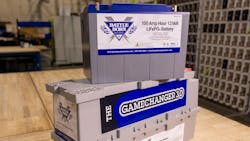The evolution of auxiliary power units in the trucking industry reflects a paradigm shift from traditional diesel-powered systems to all-electric solutions. As regulations require more sustainable solutions, the role of all-electric auxiliary power units in meeting environmental goals has changed to provide fleets with new options.
Traditionally, electric APUs were viewed as an HVAC accessory component. Today, with the proven technology advancements in batteries, fleets can use the electric APU as an integral power solution for modern trucking operations.
Before diving in, let's explore the three main types of APUs available today:
- Diesel APU: A veteran of the industry, this APU uses a small diesel engine to generate electricity. This electricity then runs the air conditioning and heating unit in the truck cabin.
- Electric (AGM) APU: This option takes a battery-based approach by using sealed lead-acid absorbent glass mats to power the climate control system and other appliances.
- Electric (LiFePO4) APU: Proven in the RV and marine markets, this is the most cutting-edge option leveraging lithium iron phosphate batteries for quiet and efficient operation.
The evolution of APUs in trucking
Historically, APUs have been simple in design and function. These units were typically diesel-powered and directly installed onto the truck. Their main function still today is to provide heating, ventilation, and air conditioning to the truck cabin.
Despite their utility, these traditional diesel APUs come with inherent drawbacks:
- Fuel consumption and emissions: Despite reducing idling, they burn diesel fuel, increasing operating costs and contributing to air pollution.
- Maintenance demands: These mechanical units require regular maintenance and are prone to wear and tear, potentially leading to breakdowns.
- Noise disruption: Their operation can be noisy and cause vibrations, disrupting driver sleep during rest periods.
- Limited functionality: Primarily designed for temperature control, they cannot power other electrical needs in the truck.
Furthermore, there is a perception in our industry that all APUs, including electric APUs, are simply HVAC solutions, not comprehensive power systems.
Let's dispel that perception.
The challenge of using AGM lead-acid batteries
Next up are electric (AGM) APUs. The persistence of using AGM lead-acid batteries in APUs today is often because of their lower upfront cost and familiarity with the technology.
However, AGM lead-acid batteries have many downsides, ranging from higher life cycle costs, higher weight and size, lower energy density, and lead environmental disposal issues.
Traditional APUs fall short today
With their limited functionality and reliance on diesel power, traditional APUs fall short of meeting the current needs of truck drivers and fleets.
Today's ever-stricter environmental regulations require cleaner solutions than traditional diesel-powered units can provide. Modern trucking operations emphasize driver comfort and safety, which requires quieter, more reliable, and versatile power solutions.
See also: Dragonfly Energy powers Highway Transport's fleet with all-electric APUs
Trucks today have more technology, requiring a complete power solution than what past APUs could offer. In addition, the efficiency demands of modern trucking operations require APUs that can operate more economically, with minimal maintenance and better integration with truck systems.
Electric APUs based on lithium batteries
Today's lithium-based APUs are designed to provide a comprehensive power solution well beyond just HVAC. They power various electronic devices and systems within the truck, supporting everything from refrigeration to entertainment systems.
Electric (LiFePO4) APUs better meet the demands of modern trucking operations in several ways.
- More power in less space: Lithium batteries offer significantly higher energy density, allowing for a smaller and lighter unit with the same power output.
- Longer lifespan: They boast a much longer cycle life, lasting two to three times longer than that of traditional AGM batteries.
- Efficient energy use: Lithium systems have higher charging and discharging efficiency, minimizing wasted energy.
- Low maintenance: Minimal maintenance is required, and they are less susceptible to problems like sulfation.
- Clean operation: These APUs produce zero emissions during use, ideal for stricter environmental regulations.
- Universal powerhouse: Unlike diesel-powered APUs, lithium electric APUs can work with various AC units from different brands as well as power all 12V auxiliary loads and devices too, offering a complete on-board power solution.
- Quiet performance: They operate much quieter, creating a more peaceful environment for drivers.
Changing perceptions and encouraging adoption
It's a given that fleets are being pulled and pushed toward more sustainable and comprehensive power solutions.
The transformation of APUs from basic HVAC support units to comprehensive lithium electric power solutions mirrors the broader evolution of the industry toward greater sustainability, efficiency, and driver comfort.
As we have seen in other industries, lithium batteries are transformative technology. It is the same for trucking with APUs; electric APUs are proving to be essential components that provide complete power solutions.
As fleets continue to search for efficient and cost-effective ways to meet their goals, shifting their perceptions of APUs and the role they can play in piecing together a strong sustainability strategy should not be underestimated.
About the Author

Wade Seaburg
Wade Seaburg is the chief revenue officer at Dragonfly Energy, where he leads sales, business development, and revenue growth and diversification efforts. He is an industry veteran who has proven long-term success serving high-volume OEMs across various markets.
